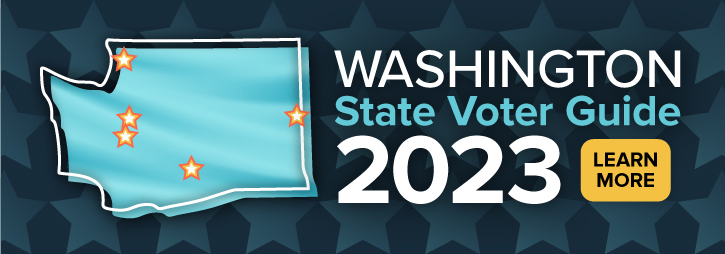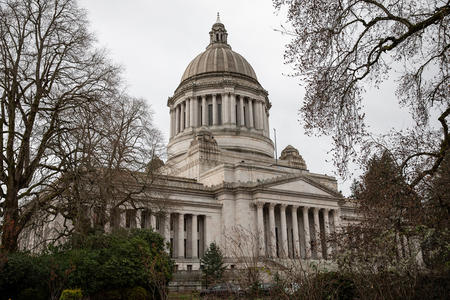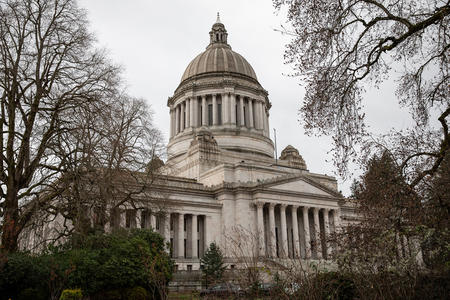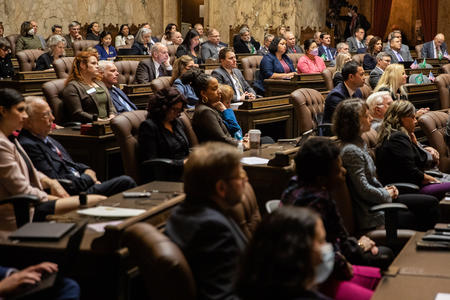The newly released records include blacked-out documents – which were released along with unredacted versions – from 11 current or former senators, according to records obtained by Crosscut and McClatchy. The list includes two Democratic state senators who have filed paperwork to run for statewide elected office: gubernatorial candidate Mark Mullet and Patty Kuderer, who is eyeing the open seat for Office of Insurance Commissioner.
The fresh batch of records sheds more light on the types of communications that lawmakers are trying to shield and the extent they think that they can redact under their self-claimed exemptions. One set of blacked-out emails includes communications with a prominent cannabis lobbyist and other documents relate to discussions about budgets. Redacted text messages from at least two lawmakers show them blacking out bill numbers, meaning the public would not even know what topics lawmakers are discussing.
This latest release raises more questions about how the Legislature has handled its self-proclaimed constitutional right to black out documents like lawmakers’ text messages, emails and memos, which all must be disclosed under Washington’s voter-approved Public Records Act. That’s the law that allows members of the public, news organizations and others to request those and other documents to understand how government officials are conducting the people’s business.
The Legislature claimed for years that they were exempt from that law. But after a legal challenge by news organizations, the Washington Supreme Court in 2019 ruled that legislators must disclose their records just like other state and local officials do.
The release of the latest batch of documents in late July has prompted yet another lawsuit against the Legislature for its redactions. Legislative officials are hoping to prevail in court in a long-sought goal to establish a constitutional secrecy clause, enshrining secrecy for legislators in the state constitution.
In January, McClatchy – which owns the Tacoma News Tribune and The Olympian – first revealed that lawmakers were redacting their documents. Lawmakers and the Legislature have been sued over the practice, including by the Washington Coalition for Open Government and public-records advocates like Arthur West. After the latest batch of redacted records was released, West sued again.
Amid the news coverage, Billig, a Democrat from Spokane, declared in February that all redacted Senate records – hundreds of pages of documents – had been released unredacted. Those records contained blacked-out portions of lawmakers’ communication on a capital gains bill, collective bargaining issues and a proposed Chinese American history month.
New practices
By then, after questions from reporters, legislative leaders had changed their internal practices for redacting records, and multiple lawmakers whose documents had been redacted said they never asserted legislative privilege to shield information from the public in the first place. Journalists learned at that time that some lawmakers were redacting records on behalf of others.
The Senate released the new records July 20 to those members of the public who originally made the requests and to news organizations like Crosscut and McClatchy, which had requested copies of records where redactions had been applied.
“We are supplementing your request with additional records,” that message stated, naming the 11 current and former lawmakers whose materials were being released.
In an email last week, Billig said his announcement in February was “based on the information I received at the time from the Senate’s Public Records Office.”
“When they recently discovered new items, they took immediate steps to make those public. The public records office deals with many requests each day and oversees literally hundreds of thousands of documents and it is clear that the office needs more support,” Billig wrote. “The Secretary of the Senate is actively working to improve functions within the office, providing more support and leadership.”
In an interview, Secretary of the Senate Sarah Bannister said the new release came after some unreleased redacted documents were discovered earlier in July. That prompted records staff to conduct a hand search to make sure they hadn’t missed more.
“In July sometime, they realized when they were doing additional document searches, that they found this and so we went back through everything, and did another hand search,” Bannister said.
The public records office is hiring another staff member to help with the work, which Bannister said is to be be filled by an attorney.
Joan Mell, a board member of the Washington Coalition for Open Government, said the latest release raises questions not only about the redactions, but about how the Legislature is handling documents to be disclosed to the public.
“The government can’t just arbitrarily willy-nilly do what it wants to do when it wants to do,” said Mell, an attorney who is helping the coalition in one of the legal challenges against the Legislature’s redactions.
“There is a need for organization in government and its management and even those in power just don’t have the luxury to do what they want to when they want to,” added Mell. “And that’s what they’re doing right now.”
Years later
July’s release echoed earlier episodes this year, when people requesting records received batches of unredacted documents months or years after the request had been made, with little context or explanation.
Gregory Foster, the founder of Cannabis Observer, a citizen watchdog group tracking state regulation of marijuana, in July received unredacted records from a request he’d made back in 2021. That request sought communications from Mullet, the moderate Democrat from Issaquah who is now running for governor.
Foster requested records related to House Bill 1443, a proposal to increase equity in Washington’s cannabis industry. Foster was looking, among other things, to find out more about two amendments to that bill that he said could have allowed for an increase in mobile cannabis licenses – ones not tied to a particular geographical area that are usable anywhere in the state.
The documents he received in July show communications among Sen. Rebecca Saldaña, D-Seattle, who sponsored one of the amendments, along with Mullet, lobbyist Vicki Christophersen and members of the state Liquor and Cannabis Board. Those amendments were ultimately withdrawn.
The documents released in July “actually directly showed what we were interested in all along, and had not been revealed by the records that we initially got,” Foster said.
In an interview, Mullet said his legislative assistant authorized using legislative privilege on that set of redactions.
“My instructions since then have been just not requesting legislative privilege,” he added.
Christophersen, executive director of the Washington Cannabusiness Association, said in an interview that she has always been open and public in airing her concerns about the mobility of such cannabis licenses. The worry is that people could take those licenses and move and wind up all congregating in one location, like Seattle or Yakima.
“What we don’t want is them to all end up in one area,” she said. A bill passed this year, Senate Bill 5080, tasks the Liquor and Cannabis Board to plan how additional licenses will be geographically distributed.
Two batches of released text messages by Democratic senators – both from 2021 – show the discussions with bill numbers redacted. By blacking out bill numbers, a requestor might not know what topic is being discussed.
Those texts are by Patty Kuderer, the Democrat from Bellevue who has filed to raise funds for the Office of Insurance Commissioner race, and Sen. Emily Randall, D-Bremerton. Kuderer’s texts redacted the mention of Senate Bill 5062, a proposed data privacy law that never passed. Randall’s texts redact mention of Senate Bill 5042, a piece of legislation concerning the Growth Management Act that passed and became law.
An exchange between Kuderer and another person in February 2021 even blacks out commentary about a House bill that had apparently just passed.
“I saw! Exciting!” Kuderer wrote in response – but with “Exciting!” blacked out in the redacted version.
Through spokespeople, both Randall and Kuderer declined to comment, citing the various pending lawsuits.
The latest batch also reveals some communications from Republican lawmakers, in the minority in the Legislature, including some from Senate Minority Leader John Braun, R-Centralia. Those redactions appeared in spring 2020 emails that discuss spending in the budget as the COVID-19 pandemic began to disrupt society. The emails suggest, among other things, drafting a bipartisan letter from lawmakers to Gov. Jay Inslee, ahead of the governor’s signing of budget bills, to suggest some vetoes.
In an email, Braun wrote that he asserted privilege originally at the advice of legal counsel. But “I didn’t recall ever asserting legislative privilege, as it is my general policy to never do so,” he added.
“When these materials were brought to my attention, I immediately waived my claim,” Braun wrote. “The documents have been provided to those who requested them, which includes several members of the press. I will continue to waive legislative privilege in the future, because I believe government should be open and transparent.”
This report was produced in collaboration with McClatchy, which owns The News Tribune (Tacoma), The Olympian, The Bellingham Herald and the Tri-City Herald.
Get more Crosscut in your inbox
Sign up for our Daily newsletter for the most important headlines of the day or sign up for our Weekly newsletter for the best stories of the week. Or, select both for more Crosscut.








